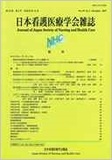Japanese
English
- 有料閲覧
- Abstract 文献概要
- 参考文献 Reference
要旨
目的:愛知県内の病院に勤務する実習指導者の職務エンパワメントの実態と関連要因を明らかにし、実習指導者育成のあり方への示唆を得た。
対象と方法:愛知県内の病床数100床以上の全病院203施設のうち承諾が得られた46施設の実習指導者816名を対象に質問紙調査を実施し、454名を分析対象とした。佐々木&菅田(2011)の『日本語版看護職の職務エンパワメント尺度』4因子31項目を用いて、職務エンパワメントに関連する要因を検討した。
結果:職務エンパワメントは、50歳以上、勤続20年以上、看護職経験30年以上、役職者、教育経験ありの者で、【情報】や【機会】などが有意に高値であった。男性が【情報】以外で、有意に高値であった。実習指導を行う時の勤務状況が専任の【情報】が有意に高く、実習指導役割継続意向H群が、すべての得点で、継続意向L群や不明群よりも有意に高値であった。学習ニードと、【支援】、【機会】、合計点との間で、弱い正の相関関係がみられた。
結論:病院の現状などの情報や研修参加の機会の提供、適切な役割や権限の付与の必要性が考えられた。職場の【支援】【資源】【機会】【情報】のソフト・ハード面の整備や、実習指導者の役割評価について検討することの重要性が示唆された。
Purpose: To clarify the current situation of and related factors to professional empowerment among clinical nursing practicum instructors employed by hospitals in Aichi Prefecture, in order to obtain suggestions for how to train clinical practicum instructors.
Subjects and Methods: Of the total 203 facilities in Aichi Prefecture with at least 100 beds, a questionnaire survey was conducted among 816 clinical practicum instructors from the 46 facilities where consent was obtained, and 454 responses were analyzed. Factors related to professional empowerment were investigated using 31 items covering 4 factors from the “Japanese Version of the Nursing Work Empowerment Scale” (Sasaki et al., 2011).
Results: For professional empowerment, significantly higher scores on “information” and “opportunity” were obtained from respondents aged 50 and over, those with at least 20 years of continuous service, those with at least 30 years of nursing experience, those in executive positions, and those with educational experience. Men had significantly higher scores for factors, except for “information”. Respondents who worked as dedicated clinical practicum instructors when doing this work scored significantly higher on “information”. The High-Group (i.e. strongly intending to continue in the role of clinical practicum instructors) scored significantly higher in all subscale scores compared to the Low-Group and the Uncertain-Group. A weak positive correlation was observed between learning needs and “support”, “opportunity” and total scores.
Conclusion: A need for information about issues such as the current situation of hospitals, provision of training opportunities, and authorization of appropriate roles and power was identified. The findings demonstrated the importance of improving both the soft and hard aspects of workplace “support”, “resources”, “opportunity” and “information”, and the importance of examining role evaluation among clinical practicum instructors.
Copyright © 2017, Japan Society of Nursing and Health Care All rights reserved.


